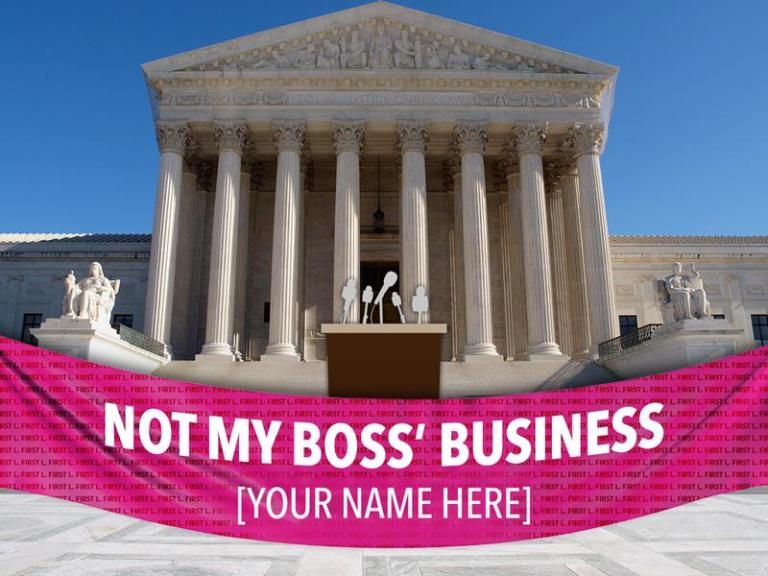Planned Parenthood use the term “women” to demarcate a group they support, trust, and represent. Since not all women want to be supported, trusted or represented by Planned Parenthood, we must charitably assume that the organization is referring to an idea of women, and not to that actual, wonderful population — les personnes de sexe féminin. As such, Planned Parenthood are responsible for defining the boundaries of their idea, i.e. when they say “women want _____” they implicitly exclude women who “don’t want _____” from their category of “women.” Our task is to answer the question: “How is Planned Parenthood’s category of “women” currently being defined?”
Consider the current debates regarding the question of whether employers ethically opposed to acts of (non-medical) contraception ought to be required by the federal government to pay for their employees’ contraceptive devices via a health insurance plan. To convince the public that employers indeed ought to, Planned Parenthood have coined the slogan “Not my boss’ business” and encouraged women to subsume their thought under it.
The conceptual transubstantiation required to get the phrase “Not my boss’ business” out of the demand that my “boss” pay for my contraceptive devices makes me tickle. It is akin to saying “Because you have nothing to do with my sex life, provide for the contraceptive devices that make up a crucial part of my sex life,” or “Because it is not your business if I have an IUD, pay for my IUD.” It occasions such sublime despair over our human capacity to make any damn sense that I find myself wishing Planned Parenthood would rise victorious — if only that they could move on to a better slogan. Add “provide contraception” to the list of fundamental duties an employer has to employees, fine — just don’t do it on the basis that your employer has nothing to do with contraception. By the actions of the HHS Mandate we are obviously, blindingly obviously giving our bosses a direct relation to our sex lives, an economic interest previously non-existent, and a business in our bedroom I promise will get creepy.
But it makes sense in its own way. To give it crowd-appeal, to make it Facebook-worthy, to craft a narrative in which ideological propositions achieve their highest level of you’d-have-to-be-an-inhuman-ball-of-mysogonistic-fire-hate-to-diasagee-with-this, the debate — which, in the courts, is being held over the complex issue of religious freedom — needs to be reduced to something of godlike simplicity: “Women need birth control and their bosses are denying them it.”
But we are interested in the effects political decision on Planned Parenthood’s idea of women. Having determined that the political battle will rage between “sex-involving-your-boss” and “sex-without-your-boss,” an aesthetic was created to promote and defend this construction — via graphics, videos, press releases, slogans, bumper-stickers and the whole abysmal slew of American politics. Since Planned Parenthood are using representations of women to craft this aesthetic — and if what we said is true, that in representing an idea of women over the diverse and disagreeable particular women they are also defining who fits and who doesn’t fit into their idea — then this aesthetic becomes a valuable tool in determining how Planned Parenthood define their category.
The first noticeable decision is that all women are represented as employees — and all their employers are men. To use a few examples from the media shared on Planned Parenthood Action’s Facebook page…


Of course, bosses are not only always men, they are also Monopoly Men — caricatures of obese, greedy, for-profit CEOs.

It is no matter that the majority of the organizations suing the federal government are non-profit organizations, many of whose oppressive force over their employees amounts to giving them one scoop instead of two from the leftovers of the soup-kitchen line — The Little Sisters of the Poor and Catholic Charities, to name a few. What matters is that the narrative presented effectively inspires the support of a media-consuming public.
But this political success — for it is an immense success — is simultaneously an ideological failure in terms of Planned Parenthood’s idea of women, who are never represented as holding positions of power. Women are the weak. Never mind that many of the “bosses” suing the federal government for forcing them to violate their ethical principles are women, like Lilli Johnson of Johnson Welded Products, Inc., Catherine A. Hartenbower of Hart Electric, LLC, Karen A. Mersino of Mersino Management Company, or Mary Jo Feltl of Feltl and Company Inc. A female boss refusing to conform with a “pro-contraception” law does not fit the narrative which will most effectively convince the public — a narrative which, to judge the media produced, amounts to that riveting bedtime story — “Bad Male Boss Oppresses Good Female Worker.” By ignoring female leaders for the sake of their political goals, Planned Parenthood unintentionally reinforce the gender inequality they rightly stand against. In representing their idea of the “women” they support and defend through the exclusion of the female boss and the over-accentuation of the male boss, Planned Parenthood have implicitly tended their idea of women towards the rank of the employee, and more than that, towards the victimized employee.
Again, this reduction of women to the category of the employed works extremely well. Who could give anything but support to a timid, bewildered-looking female employee being denied her fundamental needs by a male employer who looks like he just stepped off the set of Mad Men to steal hot chocolate from orphans?
But an argument might be made that within Planned Parenthood’s picture of women as employees is not so much the implication that she cannot or will not be a boss, but rather that — if she were a boss — she would not be opposed to paying for contraception. Now that this is factually false is obvious. Again, many of the employers suing the United States government are women. Many of the plaintiffs in general are women, like Stacy Molai or Sister Mary Catherine. And even if this were not the case, the mere fact that there are woman on this planet who are ethically opposed to paying for your non-medical contraceptive devices — who assumedly would not ditch such a conviction upon becoming a boss — this is enough to question the idea implicit in Planned Parenthood’s aesthetic, that “women — if they were employers — would have no problem paying for their employees’ contraceptives.” But again, the question is not whether Planned Parenthood are being factually accurate, but how they are defining their idea of women in their representation of “women” over against the diversity and disagreement of actual, particular women.
Here, women are incredibly mono-chromed. They are denied an ethical existence in the realm of sexuality. The Planned Parenthood idea of a woman is someone who could not possibly have an conflict between the precepts of an ethical code and the demand of employees that she pay for their contraception. “Having the proper views regarding contraception” has become a border which contains Planned Parenthood’s idea of a woman, and particular women must conform to this if they are cross the border and be included in the category.
Here we see a similarity in Planned Parenthood’s claim to represent “women” in their promotion of abortion access — despite the majority of women opposing legal abortion in all or most cases (20%, 37% respectively). Against all factual evidence, “women” are made synonymous with “pro-choice women.” “Women,” as Planned Parenthood uses the term, are synonymous with “pro-HHS-Mandate women.” In short, “women” are defined as those type of creatures who, by their very nature, agree with Planned Parenthood.
This is the logical consequence of speaking for “women” as a general category. Either your idea of women will conform to the truth about the views and positions of actual women — which will require it to become as detailed, descriptive and complex as the subject matter demands — or your idea will conform particular women unto itself. Since Planned Parenthood are speaking for “women” over and against the actual positions of particular women, I can only assume that the latter is true, that their use of the word refers to a certain category, the shape of which comes to light in their inability to represent “women” as leaders ethically-convicted against the ideology of Planned Parenthood. Women are those types of creatures who agree with Planned Parenthood, and thus they can be “stood for” and “spoken for” by the institution without contradiction.
Now while understand Planned Parenthood’s need to categorize for the sake of rhetoric — something I am certainly guilty of, as are most organizations who operate in a rhetorical mode — allow me a minor-league, existential table-flip against this impossibly paternalistic “speaking for women” that plagues America’s political scene. Women speak for themselves. Admitting this — which involves admitting that women are often your self-proclaimed enemies — is one of the most pro-woman moves a “pro-woman” institution can make. It is not an act of female treason to oppose Planned Parenthood, no, it is precisely an act of assertion that affirms “women” as neither this nor that pre-defined thing, there to be stood for, spoken for, and blithely represented. Women belong to themselves, thinking, acting and feeling out of a locus of personal interiority that no other can grasp, and on which no institution can claim a privileged access point. This incommunicable interiority is revealed in disagreement, which asserts the person against the paradigm, the ideology and the zeitgeist. The recognition of female opposition is one of the highest honors anyone who dares make the general statement “we support women” can bestow. If you believe that women are free, they must be free to disagree, free, even, to be detested by you — precisely as women. Denying this is the proposal of a universal feminine sheepishness that would never assert itself contrarily.
But this is what Planned Parenthood do in their easy, reductive schema that drives a media-consuming public from position to position. They present women as a type of being impossibly passive to their own ideology — as equatable with their ideology. The religious convictions, ethical decisions, and moral concerns that daily call all others to assert themselves in freedom — even if it is against the opinion of the entire world — these are expected to be quashed upon entry into Planned Parenthood’s category of “women.” There is no place for an ethically-convicted, independent woman within their aesthetic, simply because their narrative must remain one in which “good, female employees need contraception, and their bad, male employers are denying them it.”

















